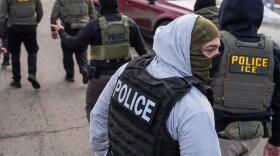President Trump says the new federal crackdown on undocumented immigrants will make our country safer. But in Hawai?i, there have not been many reports linking illegal immigration and violent crime. In the last of a series of reports, HPR contributing reporter Jackie Young investigates how safe we are now, and what may come next with the issue of illegal immigration.
“President Obama was responsible for deporting more than 2 million undocumented immigrants, but he focused on those who had committed serious crimes. President Trump’s executive order expands the scope to include virtually all undocumented immigrants, and it has raised the fear of deportation among these undocumented immigrants.”

That’s John Kawamoto, a former legislative analyst for the state House Majority Staff Office. Kawamoto thinks creating fear among immigrants actually makes us less safe, because they would be less likely to report crimes.
“Undocumented immigrants, if they know that the police are acting as ICE agents, would be very hesitant to come forward and give the police the information they need. And so our communities would be less safe.”
Kawamoto says undocumented immigrants are probably less likely to commit crimes themselves because they don’t want to call attention to their undocumented status.
When asked for statistics on crimes committed by undocumented immigrants, the Honolulu Police Department told us it does not ask anyone it arrests for their immigration status, nor does it have access to immigration data.
U.S. Immigration and Customs Enforcement told us it doesn’t have data specifically for Hawai?i, and that the vast majority of its recent arrest and removal statistics apply to the northern California area.
State Attorney General Doug Chin agrees with recent state House and City Council resolutions to not aid in any federal deportations: “I definitely believe that the House resolution as well as the City Council resolution has made very clear that the policymakers don’t want us to be using state financial resources to be able to do the work of the federal government. It’s one thing to have somebody in custody because there’s a court order, or because a judge has ordered it, or because our state laws allow us to be able to hold somebody in custody, but if we’re simply doing so because there is a request from a civil immigration official to ask us to hold him, that’s a different thing.”

But Shirlene Ostrov, the chair of the Hawai?i Republican Party, thinks we should not be protecting those who are undocumented.
“Our stance is that we believe that we’re a nation of laws, and if the federal laws say something then we should abide by it. And so sanctuary cities are not necessarily something we would abide by on a general basis because again, we believe that you should follow the laws of the government.”
Yet undocumented immigrant Shingai Masiya says immigration laws need to be made more compassionate.
“Currently I do not have a path to legal status or citizenship. This is why Congress needs to bring up the Dream Act or immigration reform up for a vote. A lot of people out there when we’re discussing immigration, are like, ‘Why don’t they just get in line?’ There is no line once you’re undocumented.”




